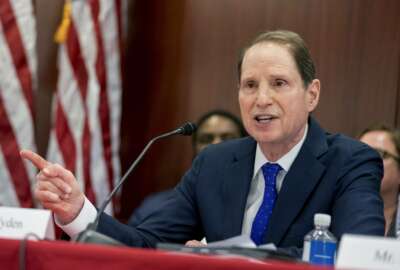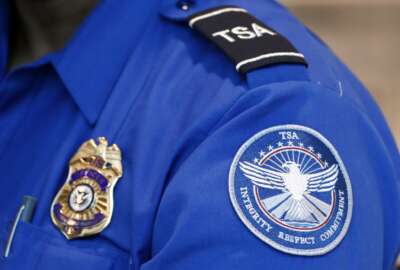To listen to the Federal Newscast on your phone or mobile device, subscribe in PodcastOne or Apple Podcasts. The best listening experience on desktop can be found using Chrome, Firefox or Safari.
- A bill designed to give transportation security officers a General Schedule pay and collective bargaining rights now has a Senate companion. Sens. Brian Schatz (D-Hawaii) and Ed Markey (D-Mass.) introduced the Rights for the TSA Workforce Act. The bill ensures TSOs don’t lose pay in the transfer to the General Schedule. It also eliminates TSA’s authority to set its own leave and performance management systems. The Senate bill has over two dozen cosponsors. The House passed a similar version of this bill before, but it’s never advanced in the Senate.
- Federal employee unions said the president’s proposed pay raise is a start. President Joe Biden recommended a 2.7% pay raise for federal employees next year. But the two largest federal employee unions want to see more. They’re urging Congress to pass legislation that calls for a 3.2% raise in 2022. The Biden administration also proposed more hiring at many civilian agencies next year. The 2022 budget request calls on agencies to hire more interns and resolve longstanding challenges with the Pathways Program. (Federal News Network)
- The Postal Service has its first fully staffed Board of Governors in a decade. The Senate confirmed President Joe Biden’s third and final pick, Anton Hajjar, former general counsel for the American Postal Workers Union. Last month the Senate approved Biden’s two other picks, former Deputy Postmaster General Ron Stroman and the head of the Vote at Home Institute, Amber McReynolds. The board will oversee agency business decisions and the implementation of its 10-year reform plan. (Federal News Network)
- The Postal Service plans to raise the price of a first-class postage stamp by the end of the summer. USPS seeks to raise the price of a stamp to 58 cents, nearly a 7% increase. USPS is nearly maxing out the new rate-setting authority it got from its regulator last November, based on a new formula that takes into account declining mail volumes and the agency’s requirement to pre-fund retiree health benefits well into the future. USPS is also sending non-voluntary reduction in force notices to some non-union management level employees. (Federal News Network)
- A new playbook from the Treasury Department’s Office of Financial Innovation and Transformation aims to build on the success of intelligent and robotics process automation over the last few years. Agency CFOs have been out in front in using RPA tools to take on low-value or manual processes. The playbook contains tools and instructions for agencies to learn how to select a business process to maximize cost savings, to identify areas that present the greatest opportunities for automation and digitization; and to choose the right software for implementation.
- The Biden administration plans to keep the good times rolling for federal technology and cybersecurity. Just a few months after receiving $1 billion for the Technology Modernization Fund, the Biden administration is asking for another $500 million to modernize federal IT. In its fiscal 2022 budget request sent to Congress, the White House wants to increase federal technology spending by 2.4% and cybersecurity spending by 14% across all civilian agencies. DHS would receive the largest increase by dollar amount while several small agencies including GSA, HUD, USAID, NSF and others would see largest increases by overall percentage. (Federal News Network)
- The Biden administration’s first full budget request gives the IRS $13.2 billion, more than a 10% increase from current levels. The request would grant $2.9 billion to taxpayer services, and $5.5 billion to its enforcement division. It also sets aside $305 million for the IRS to continue with its multi-year IT modernization plan. In return for this funding, the agency would have to give the House and Senate appropriations committees a quarterly update on IT modernization spending and progress made. (Federal News Network)
- The Defense Department plans a ramp-up in its deployment of a new electronic health record starting in September. The department plans to roll out MHS Genesis at eight large installations next fiscal year, according to budget documents the Pentagon released Friday. They’re concentrated in the southeastern U.S. and include Joint Base San Antonio-Lackland Air Force Base, Fort Hood, Fort Bragg, William Beaumont Army Medical Center at Fort Bliss, Fort Gordon, Eglin Air Force Base, and Naval Hospital Jacksonville. Up until now, the Defense Health Agency has been installing the system in sequential “waves.” Starting next year, officials will deploy Genesis at several bases at once so they can meet the target date to finish the deployment by December 2023.
- The Senate confirmed Michael McCord and Ronald Moultrie for two high-ranking positions in the Pentagon. McCord will serve as the comptroller of the Defense Department, overseeing finances and some business processes. McCord previously served in the same position in the Obama administration. Moultrie will hold the position of undersecretary for intelligence and security. He is the president and founder of Oceanus Security Strategies.
- The Defense Department is planning on spending $715 billion in 2022 and the topline number doesn’t change much from this year’s budget, but what’s inside does. The Pentagon is planning on divesting from some of its older aircraft, ships and other weapons to make more budgetary room for future technologies. DoD hopes a change in investment strategy will help the United States counter China by researching new game-changing capabilities. The 2022 budget puts more than $20 billion in space investments. It also puts more than $10 billion into cyberspace activities. The budget puts an emphasis on addressing the effects of climate change on bases and weapons as well. (Federal News Network)
Copyright
© 2024 Federal News Network. All rights reserved. This website is not intended for users located within the European Economic Area.




